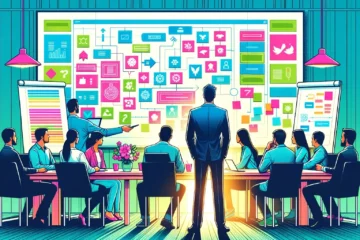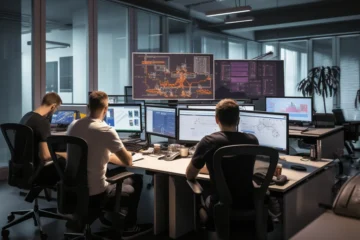On it’s way from the supplier to the final customer, any product passes a considerable chain of operations – packaging, sorting according to dimensions and destination, loading into a vehicle, unloading from transport, delivery at the buyer’s address, etc. The customer, at the same time, should have the possibility of tracking the cargo’s path during the delivery process and choose the most convenient delivery method.
Modern logistics technologies that affect the ways of cargo delivery are developing in two directions:
- Development and improvement of the logistics software. The main task of today’s logistics software products lies in the field of automation and searching for rational sorting and delivery solutions.
- Elaboration and implementation of technical means that are capable of transporting cargo with minimal human intervention. Such processes are expressed both in the introduction of robotization/automation of the sorting processes, cargo delivery, and remote control.
The rapid development of these technologies allows minimizing the amount of human labor, eliminating errors and delays in delivery.
Software That Speeds Up and Streamlines the Transportation
The efficiency of the custom software for logistics management, which helps to rationalize the ways and means of transporting goods, depends on the number of tasks solved by such software. The “starting point” for any logistics program is the moment when the delivery order receipt is created. The customer specifies the transportation method, delivery time, and location. After placing the order, the logistics program calculates the cheapest and fastest way of delivery, monitors the delivery schedule, and it’s execution.
Logistics software often has the following functions:
- Navigation helps to draw up the shortest transport routes taking into account the traffic jams, detours, weather conditions.
- Logistic planning allows minimizing the expenses by selecting the most optimal vehicles and loads.
- Tracking the movement of the vehicles and rationalizing the routes.
Unmanned Devices for Sorting, Moving, and Loading of the Goods
Today’s general trend in the logistics sector is a decrease in the number of vehicle drivers, couriers, porters, and sorters. Their functions are successfully carried out by technical means, which do not require permanent human control and intervention.
Drones
The past few years saw a sharp increase in the usage of drones for small cargo transportation. Drones, in fact, started to perform those tasks that were previously intended to walking and cycling couriers, or to local car deliveries. The use of unmanned aerial vehicles (UAV) in large cities became especially justified. Here drones can lift up the cargo to a considerable height and deliver packages to any floor.
Currently, drones transport loads of up to 10 kg. The unmanned aerial transport market research states that the use of UAVs will become more and more widespread, and the increase in the unmanned airborne cargo transport on a global market will be about 21% annually.
Warehouse Robotization and Automation
Another promising trend in logistics is the introduction of self-learned robots that can make independent decisions. Robots are excellent manipulators and are capable of sorting, packaging, transferring parcels from racks to a truck, and other similar tasks. Such automated warehouses accelerate and simplify storage logistics processes and minimize errors during any goods manipulation. According to analysts of Amazon – the world’s most extensive online trading platform – the robots’ use can reduce the logistics costs of any product by 20-40%, compared to the manual processing.
Unmanned Transports
The delivery of orders with automated vehicles becomes more and more customary now. The increasingly sophisticated autopilots allow them to navigate the traffic safely, avoid other cars, and strictly follow the traffic rules. As of today, such automobiles do not develop high speeds, do not travel far, and are designed for city use mostly. Nevertheless, a lot of tech companies promote respective research and develop high-load unmanned trucks. Take for instance Tesla Semi electro trucks, which already have reached the stage of field testing.
The main task of logistics is finding the fastest and least expensive algorithms for the distribution of goods. The introduction of technical means for managing the cargo with minimal human intervention, or even without it, dictates the main trends of today’s logistics technologies development.
Conclusion
In reality, not every company can afford the introduction of technological innovations such as drones, robots, and other interesting new products into their daily practice. The high cost of innovation is a major barrier for many businesses. While global corporations such as Amazon have sizeable research and adoption budgets, such expenses can be inadmissible for smaller regional companies.
Nonetheless, the custom software that allows optimizing the logistics activities is quite economical for any company that deals with deliveries. It always turns out to be cost-effective, as it helps to save on vehicle fuel, employee time, and other expenses. The logistic software products that we create are of this type – the calculation of logistic tasks with its help becomes faster, and the proposed solutions are always the most rational.

New Trends in Energy Trading and Risk Management Software











